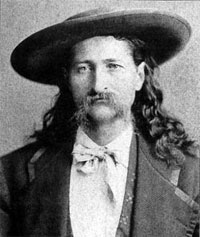
James Butler Hickok (1837-1876)
James Butler Hickok (May 27, 1837-August 2, 1876) better known as Wild Bill Hickok, was a semi-legendary figure in the American Wild West.
Hickok was born in Troy Grove, Illinois. He left his father's farm in 1855 to be a stagecoach driver on the Santa Fe and Oregon Trails. His gunfighting skills led to his nickname. In 1857, he claimed a 160 acre tract of land in Johnson County, Kansas (in what is now the city of Lenexa) and became constable of Monticello Township. In 1861, he became a town constable in Nebraska. He became well-known for single-handedly capturing the McCanles gang, through the use of a ruse.
After the American Civil War, Hickok became an army scout and a professional gambler. In 1867, his fame increased from an interview by Henry Morton Stanley. Hickok's killing of Whistler the Peacemaker with a long range rifle shot had influence in preventing the Sioux from uniting to resist the settler incursions into the Black Hills.
In 1871, Hickok became marshal of Abilene, Kansas. His encounter there with John Wesley Hardin resulted in the latter fleeing the town after Wild Bill managed to disarm him.
Hickok toured with Buffalo Bill's Wild West show in 1872-1873, where he befriended Calamity Jane, who was later to claim a romantic relationship which appears dubious, Hickok being newly married and greatly enamored of his wife. He was fired from the show due to drunkenness. The two were to meet again in Charlie Utter's 1876 wagon train from Colorado to Deadwood, South Dakota, where the three of them remained close friends.
On August 2, 1876, while playing poker at Nuttal & Mann's "Saloon No. 10" in Deadwood (then part of the Dakota Territory but on Indian land), Hickok could not find an empty seat in the corner, where he always sat in order to protect himself against sneak attacks from behind, and instead sat with his back to the door; unfortunately, his previous caution proved wise, as he was shot in the back of the head with a double-action .45 caliber revolver by Jack McCall. The motive for the killing is still debated. (McCall may have been paid for the deed, it may have just been the result of a recent dispute, or McCall may, in a drunken rage, have become enraged over what he perceived as a condescending offer from Hickok to let him have enough money for breakfast after he had lost all his money playing poker the previous day.) McCall claimed at the resulting two-hour trial by a motley group of assembled miners and businessmen that he was avenging Hickok's earlier slaying of his brother and was acquitted, resulting in the Black Hills Pioneer editorializing: "Should it ever be our misfortune to kill a man . . . we would simply ask that our trial may take place in some of the mining camps of these hills". McCall was subsequently rearrested and a new trial was held. Hickok's brother, Lorenzo Butler Hickok, traveled from Illinois to attend the retrial. This time McCall was found guilty and hanged. After his execution it was determined that McCall had never even had a brother.
The saloon proprietor claimed that, at the time of his death, Hickok held a pair of aces and a pair of eights, with all cards black, and this has since been called a "dead man's hand".
Utter claimed the body, and placed a notice in the local newspaper, the Black Hills Pioneer, which read: "Died in Deadwood, Black Hills, August 2, 1876, from the effects of a pistol shot, J. B. Hickok (Wild Bill) formerly of Cheyenne, Wyoming. Funeral services will be held at Charlie Utter's Camp, on Thursday afternoon, August 3, 1876, at 3 o'clock, P. M. All are respectfully invited to attend." Almost the entire town attended the funeral, and Utter had Hickok buried with a wooden grave marker reading: "Wild Bill, J. B. Hickok killed by the assassin Jack McCall in Deadwood, Black Hills, August 2d, 1876. Pard, we will meet again in the happy hunting ground to part no more. Good bye, Colorado Charlie, C. H. Utter."
At the urging of Calamity Jane, Utter in 1879 had Hickok reinterred in a ten foot square plot at the Mount Moriah Cemetery, surrounded by a cast-iron fence with an American flag in the ground. A monument has since been built there. In accordance with her dying wish, Calamity Jane was buried next to him.
Shortly before Hickok's death, he wrote a letter to his new wife, which in retrospect seems eerily prescient: "Agnes Darling, if such should be we never meet again, while firing my last shot, I will gently breathe the name of my wife—Agnes—and with wishes even for my enemies I will make the plunge and try to swim to the other shore".
The last days of Hickok's life are a subject of the Deadwood TV series, where he is portrayed by Keith Carradine.
Hickok was inducted into the Poker Hall of Fame in 1979.
Hickok's supposed death chair is now in a glass case above the saloon entrance, though the saloon itself was moved after the original #10 burned down; the original site is down the street to the north about a block away.